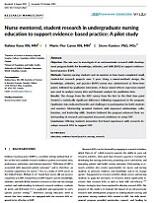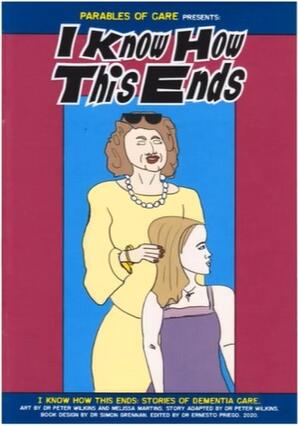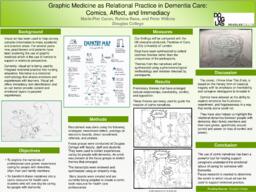Caron, Marie-Pier
Person Preferred Name
Marie-Pier Caron
Position
Faculty Member
Department
Status
current
Affiliation Date
2014 to open end
Related Works
Content type
Digital Document
Abstract
The aim was to investigate if an extracurricular research skills development program builds the knowledge, attitudes, and skills (KAS) to support evidence-based practice (EBP). Twenty nursing students and six mentors in four teams completed small, student-led research projects over 1 year. Using a mixed-methods design, the knowledge, attitudes, and practice (KAP) survey was administered at three-time points, followed by qualitative interviews. A linear mixed-effects regression model was used to analyze survey data and thematic analysis for qualitative data. The change from the KAP survey from the first to the third time point showed a statistically significant difference following engagement in the program. Qualitative data indicated benefits and challenges to participation for both students and mentors. Mentorship provided students with improved relationships, collaboration, and leadership skills. Students believed the program enhanced their understanding of research and reported increased confidence in using EBP.
Acknowledgements: This study was supported by the Douglas College Research Incentive Grant. The author was a participant in the 2021 National League for Nursing (NLN) Scholarly Writing Retreat, sponsored by the NLN/Chamberlain University College of Nursing Center for the Advancement of the Science of Nursing Education.
Origin Information
Content type
Video
Description / Synopsis
Presented at the DC Research Café (May 14, 2020). Peter Wilkins presents the Douglas College Dementia Comics project which explores the potential of comics to enhance the impact of dementia care research. I Know How This Ends is the second volume in a series that started with Parables of Care: Creative Responses to Dementia Care (2017). This comic book presents, in synthesized form, stories crafted from narrative data collected via interviews with professional caregivers, educators, and staff at Douglas College in Vancouver, Canada, who have cared for relatives and people with dementia in hospital. The intention of the book is to show the importance of feeling in care-giving, the professional aspects of which are sometimes at odds with the family systems aspect of dementia. Douglas College Comics Project members also Marie-Pier Caron, Nursing and Ruhina Rana, Nursing.
Origin Information
Content type
Digital Document
Abstract
Presented at the Canadian Centre on Substance Use and Addiction's <a href="https://issuesofsubstance.ca/">Issues of Substance</a> conference, Ottawa, Ontario (November 25-27, 2019).
<p>Opioid overdoses remain a significant public health issue in British Columbia. BC’s Centre for Disease Control observed the high water mark of the crisis in January of 2017 and March 2018, when the province saw an annualized death rate of nearly 3.5/100,000. Today, the death rate has subsided to 1.45/100,000 (BCCDC, 2019). Irvine et al. (2019) attribute this decrease to a suite of harm reduction measures introduced by public health authorities.</p>
<p>Although substance use patterns in post-secondary institutions are a well-studied phenomenon, there is little recent and local evidence to capture a useful description of students’ substance use in relation to recent mounting risks from the opioid crisis in BC. As such, the objective of this study is to explore students’ substance use patterns, and their understanding of related harm-reduction information.</p>
<p>The study established a clear understanding of students’ current substance use patterns and harm reduction practices across the Greater Vancouver Area. The researchers will use the data to support and reinforce harm reduction intervention programs throughout the college. The study was conducted at Douglas College in British Columbia. Douglas College is a public post-secondary institution located in Coquitlam and New Westminster. The college offers a variety of career programs, transfer course credits, continuing education, and associate degrees (Douglas College, 2019). It is home to 24,801 students, with 4,210 of those students being international students (Institutional Effectiveness Office, 2019). It currently does not offer on-site health services nor residency for students making the researchers’ harm reduction interventions essential on campus. Funding was obtained through The Research and Scholarly Activity Project Fund at Douglas College.</p>
Origin Information
Content type
Digital Document
Abstract
Poster presentation at the <a href="https://wnrcasn.ca/index.php">Western North-Western Region Canadian Association of Schools of Nursing (WNRCASN)</a> conference, Edmonton, Canada (February 20-22, 2019).
<p> Relational practice is woven through most nursing curriculums but finding engaging and innovative ways to integrate it into courses is challenging. Our project uses visual art to integrate relational practice into nursing education. Pedagogies like relational inquiry emphasize contextual learning and the uniqueness of individual lived experiences (Hartrick, Doane & Varcoe, 2015). Narrative is a relational methodology that shares emotions and experiences with learners, but prose narratives can be just more text in a pile of text, unable to distinguish themselves from other, more technical, course readings. Visual art, meanwhile, offers immediacy and identification and so can better provide context and emotional layers to peoples’ experiences. For several years now, practitioners and patients have been exploring graphic medicine, the use of comics to support a relational perspective (Williams, n.d.). Our project explores the narratives of professional care givers in their experience of people with dementia, often their own family members. These narratives are being transformed into a comic resource for students who will one day be caring for people with dementia. The comic, <i>I Know How This Ends</i> , is based on the literary form of classical tragedy with its emphasis on inevitability and caregiver stratagems to forestall it. Comics have allowed us the ability to explore emotions like frustration, resentment, and hopelessness in a way that words alone could not. They have also helped us highlight the relational dynamics between people with dementia, their family members and their care givers, specifically around control and power (or loss of control and power). Our talk will argue the efficacy of comics art as a pedagogical strategy for improving relational practice.</p>
<p> References </p>
Hartrick Doane, G. & Varcoe, C. (2015). How to nurse? Relational inquiry with individuals and families in changing health and healthcare contexts. Philadelphia: Lippincott, Williams & Wilkins.
Williams, I. (n.d.). Why “Graphic Medicine”? Retrieved from https://www.graphicmedicine.org/why-graphic-medicine/
Origin Information




